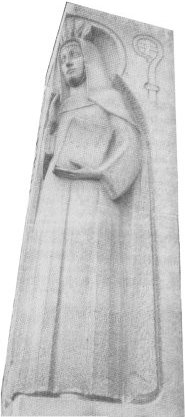
|
Hildegard of Bingen (1098-1179)
 No hero can be a hero to us unless and until we can hear, or read,
his or her story - or piece it together for ourselves. And in many ways, retelling
the story for ourselves or sharing it with other people is best of all. Where Hildegard is
concerned we are fortunate both in relation to her own times, and to ours:
No hero can be a hero to us unless and until we can hear, or read,
his or her story - or piece it together for ourselves. And in many ways, retelling
the story for ourselves or sharing it with other people is best of all. Where Hildegard is
concerned we are fortunate both in relation to her own times, and to ours:
- she wrote remarkably herself (and was privileged, as a woman in twelfth century Germany, to be able to write in Latin)
- she had her life written as a consequence of the fame she achieved in her own society
- she composed what is by all accounts (I’m still waiting to hear it!) amazing, innovative, rhapsodic music, just at the time when a meaningful and durable musical notation first became available
- she was able to have her visionary experiences rendered in the imagery of manuscript illumination
And now we have access to her music through popular CD recordings, and we are past that cultural phase represented by The Penguin Dictionary of Saints which, while admiring her energy and devotion, alludes somewhat patronisingly to her "rather excitable temperament" and to her "highly coloured and often no less highly mysterious... ‘oracles’ and ‘revelations’". Now, indeed, we can see her as a heroine from at least three perspectives:
- that of secular feminism (as exemplified by Sabina Flanagan in her Hildegard of Bingen: a Visionary Life, Routledge 1989)
- from the enduring perspective of Christian faith
- from that of the contemporary Christian, affirming and exploring the ministry of women in today’s church
Remarkably, we find her (following the acceptance of her prophetic gifts by the Pope) going on preaching tours through Germany, advising the Great and (Not-so-) Good in the Church and State of her day, and answering queries from ordinary people (often far more directly and helpfully, by all accounts, than she did when diplomatic prudence was an unavoidable factor). Besides this she transferred her convent from the delightfully named Disibodenberg (where she had begun the religious life as an anchoress, instructed by another remarkable woman, Jutta, but where the adjacent male Benedictine monastery, initially sustaining, had become a constraint) to Rupertsberg near Bingen. And she had endured a lifelong struggle with illness.
Sabina Flanagan argues persuasively that this illness was a form of migraine, and that the visual disturbance, coruscating light patterns (sometimes containing or suggesting visual images), and sensations of deepened insight or heightened consciousness at certain phases in the course of a migraine, must have contributed largely to the development of Hildegard’s ‘visionary life’ and writing. This way it becomes easy to introduce a purely secular (though still admiring) interpretation - Hildegard used these experiences to free her mind, and overcome her long-conditioned sense of feminine ‘inferiority’. Or we can see the experience, despite its physiological basis, as a mode of access to genuine spiritual insight, setting aside not just the domineering influence of men in medieval society, but many of the other constraints on thought and perception at that time (and we might be equally thankful if we could be similarly delivered from some of our constraints!). Hildegard was certainly freed for a remarkably systematic enquiry into all the available knowledge of her time. She represents an alternative development of medieval thought from the great Scholastic tradition represented by St Thomas Aquinas (see Jim McLean’s article in this same issue).
For me, doing my own paraphrase from a translation of one of her hymns, there was a remarkable sense of continuity. Hildegard reflects the power of the Spirit - His absolutely ruthless application of the right treatment, whether consoling or chastising the human soul. And she also shows (it seems) enormous intellectual daring, and a poet’s sense of the need to transform language in tune with every subject addressed. Her twelfth-century sense of the here-and-now set mine to work, however inadequately in the face of this true ‘Hero of the Spirit’.
Read Robert's paraphrase of her Hymn to the Holy Spirit.
Return to the Articles contents page
http://www.stpetersnottingham.org/heroes/hildegard.htm
© St Peter's Church, Nottingham
Last revised 27th September 1998